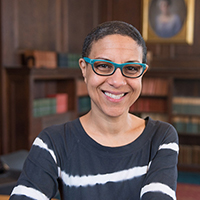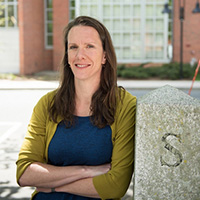Teaching Mentors
The Sherrerd Center for Teaching & Learning has had two teaching mentors since 2018–19 whose job it is to share innovative practices and strategies with colleagues.
We are delighted to announce that our Teaching Mentors program continues through the 2023–24 academic year with two mentors for equitable and inclusive pedagogies. This year, the Sherrerd Center is pleased to welcome Kate Queeney (CHM) into the teaching mentor role, along with Elizabeth Pryor (HST), who will continue as a teaching mentor. We are excited for the experience that both mentors bring to the Sherrerd Center. The teaching mentors program exists to help all members of our community with their teaching, so if you wish to schedule a meeting with either of our teaching mentors, please fill out this form.
Sherrerd mentors Liz Pryor and Kate Queeney are available to faculty and staff to talk about anything related to your teaching. A conversation can happen once or can be ongoing through the year or semester. Please know these conversations are confidential and not evaluative. The conversations are an opportunity to talk with a colleague about some aspect of the teaching-learning process. Conversations may be philosophical, operational or anything in between. Topics may include sequencing a course or lesson, getting students to be more aware of their own learning, assessment, grading, designing group activities, establishing norms or making sense of student feedback.
Teaching Mentors for 2023-24
 Elizabeth Stordeur Pryor
Elizabeth Stordeur Pryor

Elizabeth Stordeur Pryor will continue as a teaching mentor for inclusive and equitable pedagogies for the 2023-2024 academic year. Liz explores the conundrum: How to teach difficult subjects about race, especially from the past, without inflicting harm in the present. Her particular interest focuses on the “n-word”—a word that is prevalent in both racist and anti-racist documents, art, literature and politics—but one that poses a problem when invoked insensitively in academic spaces. Pryor will work with faculty (using the Teaching Circle paradigm and other strategies) to imagine pedagogical techniques that seek to mitigate n-word incidents (and the like) in the Smith community. Using the classroom itself as a point of entry, she will create strategies for navigating difficult language in the classroom as well as the increasingly intense student responses to the political and social landscape of Smith and the nation. Liz imagines herself as a collaborator with whom faculty members can brainstorm and strategize to create inclusive and equitable classroom spaces.
 Kate Queeny
Kate Queeny

Kate Queeney will begin as a teaching mentor for inclusive and equitable pedagogies for the 2023–24 academic year. As a physical chemist, Kate teaches at both the introductory and upper levels in the chemistry sequence. She thinks a lot about how to incorporate active learning in small and large classes and about how to make an inclusive classroom environment for students who come in with a wide range of prior experiences with and relationships to the subjects she teaches. Kate looks forward to working with faculty on making courses and classrooms that welcome all students, are sustainable for the faculty who teach in them, and foster joy in the work of grappling with challenging ideas.
